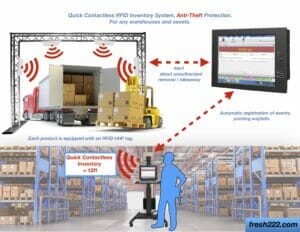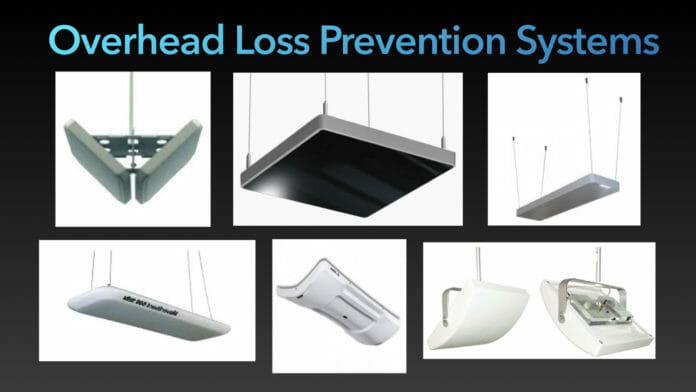Warehouse Loss Prevention refers to the set of strategies, protocols, and measures implemented by businesses to mitigate and minimize the risk of theft, damage, and operational inefficiencies related to their inventory and warehouse operations. It involves the implementation of physical security measures, advanced technologies, employee training, and strict operational protocols to safeguard valuable inventory, maintain profitability, and ensure the smooth functioning of warehouse operations. The goal of warehouse loss prevention is to prevent or reduce the occurrence of inventory shrinkage and associated financial losses, protect the company’s reputation, and maintain customer satisfaction by ensuring the availability and integrity of products within the warehouse environment.
Warehouse Loss Prevention: Safeguarding Your Inventory and Profits
Introduction
In today’s highly competitive business landscape, effective loss prevention strategies are crucial for businesses to protect their valuable inventory and ensure the sustainability of their operations. Warehouse loss, which includes theft, damage, and other forms of shrinkage, can significantly impact a company’s bottom line. In this comprehensive guide, we will delve into the world of warehouse loss prevention, exploring best practices, innovative technologies, and expert insights to help you safeguard your inventory and profits.
Warehouse loss prevention system.

Warehouse Loss Prevention: A Vital Concern
Loss prevention in warehouses has emerged as a critical concern for businesses across industries. The complex nature of supply chains, coupled with the increasing sophistication of criminals, poses significant challenges for organizations striving to mitigate losses. Warehouse loss prevention involves a multi-faceted approach that encompasses various security measures, advanced technologies, and employee training to combat theft, damage, and operational inefficiencies.
Warehouse Loss Prevention Using RFID UHF Technology

Warehouse loss prevention is a critical aspect of managing inventory and minimizing financial losses due to theft or misplacement of goods. RFID (Radio Frequency Identification) technology, specifically UHF (Ultra-High Frequency) RFID, offers an effective solution for improving warehouse security and enhancing inventory management.
UHF RFID technology utilizes radio waves to transmit data between RFID tags and readers. It allows for quick and accurate identification of items, making it ideal for large-scale warehouse operations. Here’s how RFID UHF technology can be employed for warehouse loss prevention:
- Asset Tracking: RFID tags can be attached to individual items or pallets, enabling real-time tracking of inventory within the warehouse. As items move through different areas or storage locations, RFID readers placed strategically throughout the facility can automatically scan and update the location information in the central database. This helps prevent theft and assists in locating misplaced items promptly.
- Access Control: RFID can be used to control access to restricted areas within the warehouse. Employees can be issued RFID-enabled access cards or badges, allowing them entry only to authorized zones. This helps prevent unauthorized personnel from accessing valuable inventory or sensitive areas, enhancing security measures.
- Anti-Theft Measures: RFID tags can trigger alarms when moved outside designated areas without proper authorization. If an item with an RFID tag is taken beyond a specific zone without being properly checked out, the RFID readers can detect it and activate an alarm system. This immediate notification helps prevent theft attempts and allows for prompt response by security personnel.
- Inventory Auditing: Conducting regular inventory audits is crucial for identifying discrepancies and detecting potential losses. RFID technology simplifies this process by providing real-time visibility into the warehouse inventory. RFID readers can scan multiple items simultaneously, significantly reducing the time and effort required for manual inventory checks. This enables more frequent audits and minimizes the chances of unnoticed inventory shrinkage.
- Data Analytics: The data collected by RFID systems can be utilized to analyze patterns, identify trends, and optimize warehouse operations. By analyzing the movement of goods, identifying high-risk areas, and tracking employee activities, warehouse managers can proactively implement preventive measures and streamline processes to reduce losses further.
- Integration with Existing Systems: RFID UHF technology can be integrated with existing warehouse management systems (WMS) and other security systems. This integration allows for seamless data exchange and provides a holistic view of warehouse operations. It enables the automation of various tasks, such as updating inventory records, generating alerts, and triggering appropriate actions based on predefined rules.
In summary, leveraging RFID UHF technology in warehouse loss prevention can significantly enhance security, streamline inventory management, and reduce financial losses. By implementing asset tracking, access control, anti-theft measures, inventory auditing, data analytics, and system integration, warehouses can improve their overall operational efficiency while ensuring the protection of valuable assets.
Download Warehouse Loss Prevention Software
The Impact of Warehouse Loss

Warehouse loss can have severe repercussions on a company’s financial health and overall performance. Here are some key ways in which warehouse loss can impact a business:
- Financial Loss: Warehouse loss directly affects a company’s financial bottom line. Stolen or damaged inventory translates into lost revenue and decreased profitability.
- Reputation Damage: Incidents of warehouse loss can tarnish a company’s reputation, leading to a loss of customer trust and potential business opportunities.
- Operational Disruptions: Theft or damage to critical inventory disrupts operational efficiency, causing delays in order fulfillment and potentially resulting in dissatisfied customers.
- Higher Insurance Costs: Frequent incidents of warehouse loss may result in increased insurance premiums, adding to the overall cost burden for the company.
Given these potential consequences, implementing effective warehouse loss prevention measures is essential for organizations seeking to protect their assets and maintain a competitive edge.
The Key Components of Warehouse Loss Prevention
Effective warehouse loss prevention strategies involve a combination of physical security measures, advanced technologies, employee training, and strict operational protocols. Let’s explore each component in detail:
1. Physical Security Measures
Physical security measures form the foundation of warehouse loss prevention efforts. These measures include:
- Perimeter Security: Secure fencing, access control systems, and video surveillance help deter unauthorized entry into the warehouse premises.
- Lighting: Well-lit areas both inside and outside the warehouse act as deterrents and aid in capturing clear video footage.
- Locking Mechanisms: Strong locks on doors, windows, and storage containers enhance security and prevent unauthorized access.
2. Advanced Technologies
The integration of advanced technologies is crucial in modern warehouse loss prevention strategies. Some key technologies to consider include:
- Video Surveillance: High-resolution cameras strategically placed throughout the warehouse provide real-time monitoring and video evidence in the event of an incident.
- Intrusion Detection Systems: Motion sensors, alarms, and other detection systems can alert security personnel when unauthorized access is detected.
- RFID and Barcode Systems: Radio Frequency Identification (RFID) and barcode systems enable accurate inventory tracking, reducing the risk of loss and improving operational efficiency.
Download Warehouse Loss Prevention Software
3. Employee Training

Investing in comprehensive employee training programs is vital to creating a culture of awareness and accountability. Key aspects of employee training should include:
- Security Awareness: Educating employees about the importance of warehouse security, including recognizing suspicious activities and reporting incidents promptly.
- Standard Operating Procedures: Training employees on following established protocols for inventory handling, storage, and shipment verification.
- Conflict Resolution: Equipping employees with conflict resolution skills to defuse potentially volatile situations and prevent escalation.
4. Strict Operational Protocols
Implementing strict operational protocols ensures consistency and accountability in warehouse operations. Some key protocols to consider are:
- Access Control: Limiting access to authorized personnel through the use of identification badges, biometric systems, or access codes.
- Inventory Audits: Regularly conducting comprehensive inventory audits to identify discrepancies and minimize the risk of internal or external theft.
- Vendor Screening: Implementing stringent vendor screening processes to minimize the risk of theft or collusion with external parties.
Warehouse Loss Prevention FAQs
FAQ 1: What are the common causes of warehouse loss?
Warehouse loss can occur due to various reasons, including theft by employees or external parties, operational errors, ineffective security measures, and inadequate training protocols.
FAQ 2: How can I identify vulnerabilities in my warehouse security?
Conducting a thorough security assessment and risk analysis can help identify vulnerabilities in your warehouse security. This process involves evaluating physical security measures, technological systems, employee practices, and operational protocols.
FAQ 3: Are there specialized loss prevention companies that can assist with warehouse security?
Yes, several specialized loss prevention companies offer comprehensive services tailored to warehouse security. These companies provide expertise in risk assessment, technology integration, training programs, and ongoing support to enhance your warehouse loss prevention efforts.
FAQ 4: What role does inventory management play in warehouse loss prevention?
Effective inventory management, including accurate tracking, regular audits, and optimized storage practices, is essential for minimizing the risk of warehouse loss. By implementing robust inventory management systems, businesses can identify discrepancies and address potential issues promptly.
FAQ 5: How can I keep my employees motivated to follow loss prevention protocols?
Motivating employees to follow loss prevention protocols involves fostering a culture of accountability, recognition, and continuous improvement. Regular training sessions, performance incentives, and open communication channels can contribute to employee engagement and adherence to security protocols.
FAQ 6: What steps can I take to reduce the risk of internal theft?
To reduce the risk of internal theft, implement strong access control measures, conduct thorough background checks during the hiring process, foster a positive work environment, and maintain open lines of communication to encourage reporting of suspicious activities.
Conclusion
Loss prevention is a critical aspect of any business’s operations. By implementing a comprehensive approach that combines physical security measures, advanced technologies, employee training, and strict operational protocols, organizations can mitigate the risk of theft, damage, and operational disruptions. Investing in warehouse loss prevention not only safeguards valuable inventory but also ensures the long-term sustainability and profitability of the business.
Contact us today to protect your warehouse from losses. Fresh USA, Inc.






